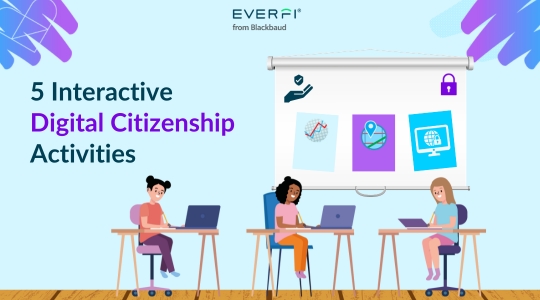As educators, our common goal is to build a generation of young people with the skills, knowledge, and understanding to succeed in college, careers, and community as upstanding citizens and learners— not just in their hometown, but in any city in the world. Supporting our students in becoming 21st Century Learners by developing self-awareness, responsible decision-making, relationship building, social awareness skills, and self-management will prepare them to be responsible and safe in all kinds of environments, and one way we can do that is through incorporating hands-on digital citizenship activities.
I use hands-on digital citizenship activities with my students by incorporating the 4 C’s: Critical Thinking, Communication, Collaboration, and Creativity. My students learn how to access and use technology in safe and responsible ways in areas including cyberbullying, privacy and responsible social networking.
To make digital citizenship for students engaging and fun, I use EVERFI’s digital citizenship lessons, Ignition: Digital Literacy and Responsibility, which offers simulations to teach students how to access and use technology effectively and safely. Ignition is made up of seven interactive digital citizenship lessons that can be used in tandem with hands-on activities to encourage even more student collaboration,problem-solving, and good digital citizenship.
Here are 5 Hands-On Digital Citizenship Activities for the Classroom
1. Digital Citizenship Activity for Public Service
Have students create public service announcements (PSAs) on digital citizenship. Assign each student or group a subtopic or let them pick what “speaks” to them. Each PSA should only be 2-3 minutes long. You can use online video creators like www.animoto.com or Spark Adobe to create the video or take it one step further and use green screening. When students are creating their script, have them use the collaboration features in Google Docs or Office 365. This digital citizenship lesson could turn into a contest that students vote on to be featured at a school event or played on the school news.
2. Persuasive Ads
Have students create a flyer/poster or t-shirt with the call-to-action being to stand up against cyberbullying. You can use applications like Canva or Google Drawings, or unplug and create paper-based posters. Once again, this fun digital citizenship activity can be turned into a school-wide contest or a fundraiser.
3. Scaling Digital Literacy for Increased Parent Involvement
Host a parent and community event where the students are the teachers, presenting to the adults. They can showcase videos, present on the different subtopics of digital citizenship, develop games, skits, or role-playing scenarios for participation. Not only will the students be showing what they know by applying what they learned but getting the awareness out family and community members. Check out Common Sense Media for ideas and resources for connecting with families.
4. Creative Writing Digital Citizenship Activity
Become authors and publishers! Have students write digital citizenship themed books geared to younger students – picture books, graphic novels, etc. You can create these in many of the GAFE apps or within Office 365 or one of the many online student publishing programs like www.classroomauthors.com, www.boomwriter.com or www.makebeliefscomix.com.
5. Make Musical Connections
Allow your students to get their creative juices flowing by creating poems or lyrics for a song or rap about digital citizenship. To make this fun digital citizenship activity more engaging, You can combine poems into a class book or enlist the help of the music and band teachers to actually get the lyrics to music.
By teaching good digital citizenship in school, we are building a generation of young people with the skills, knowledge, and understanding to succeed in college, careers, and community as upstanding citizens and learners. When working with other teachers on EdTech topics, I always emphasize that we must “teach students for the world they live in” and today’s digital world is exactly that.


